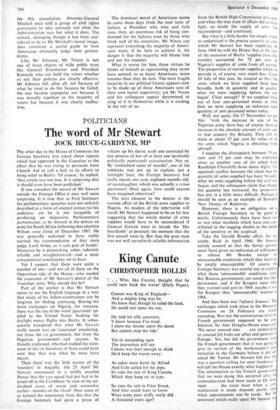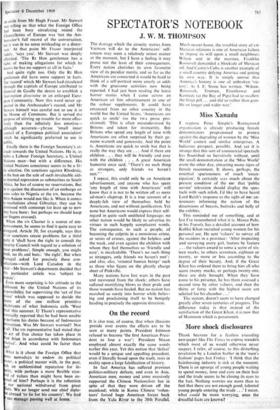POLITICIANS
The word of Mr Stewart
JOCK BRUCE-GARDYNE, MP
The other day in the House of Commons the Foreign Secretary was asked about reports which had appeared in the Guardian to the
effect that he was trying to persuade Joint Church Aid to call a halt to its efforts to bring relief to Biafra. 'Of course,' he replied, 'that article was not true. It is surprising that it should even have been published.'
If one considers the record of Mr Stewart outside the Foreign Office it may well seem surprising. It is true that as First Secretary his parliamentary speeches were not unfairly described as a form of oriental torture for his audience; yet he is not incapable of producing an impressive Parliamentary performance, as he showed in the debate on arms for South Africa following that abortive
Wilson coup d'etat of December 1967. He was generally reckoned to have richly merited the commendation of that stern judge, Lord Attlee, as 'a safe pair of hands'. Moreover he is painstaking, sober, infinitely reliable and straightforward—and a most conscientiousconstituency MP to boot.
Yet I suspect that there were quite a number of MPS—and not all of them on the Opposition side of the House—who needed the assurance of Mr Stewart's denial of the Guardian story. Why should this be?
Part of the answer is that Mr Stewart seems to use 'the English language in a way that many of his fellow-countrymen can be forgiven for finding confusing. During his latest exchanges on Nigeria, for instance, there was the use of the word 'guarantee' ap- plied to the United States' backing for daylight mercy flights into Biafra. It subse- quently transpired that what Mr Stewart really meant was an 'assurance' emanating, not from the us government, but from the
Nigerian government—and anyone, he blandly explained, who had studied the state- ment of the us Secretary of State could have seen that that was what he must have meant.
Then there was the little matter of the `murders' in Anguilla. On 23 April Mr Stewart announced to a mildly puzzled House that the vice squad had just had to be jetted off to the Caribbean 'in view of the un- doubted cases of arson and—somewhat earlier—murder on the island'. Now some of us formed the impression from this that the Foreign Secretary had quite a posse of
villains up his sleeve, each one convicted by due process of law of at least one (probably politically motivated) assassination. Not so. By 'undoubted cases of murder', one of his sidekicks was put up to explain, just a fortnight later, the Foreign Secretary had really meant one case, eighteen months old, of manslaughter, which was actually a crime passionnel. Once again, how could anyone have imagined otherwise?
The next element in the dossier is the curious affair of the British arms supplies to Nigeria. As readers of the SPECTATOR will recall, Mr Stewart happened to be on his feet suggesting that the whole matter of arms supplies would have to be reconsidered if General Gowon were to invade the 'Ibo heartlands' at precisely the moment that the first assault went in. But then the poor man was not well servedwith reliable information from the British High Commission in Lagos; and when the true state of affairs did come to light, no doubt the supply of arms Way reconsidered—and continued.
But what is a little harder for simple minds to understand is the precise quantity of arms which Mr Stewart has been supplying. In June 1968 he told the House that at the time of the secession of Biafra 'supplies from this country accounted for 75 per cent of Nigeria's supplies of arms from all sources. The proportion of current supplies which we provide is, of course, very much less. Come ' 10 July of this year, he assured us that 'the arms which we have supplied have been broadly, both in quantity and in quality, what we were supplying before the war began'. Clear enough? If we supplied three out of four anti-personnel mines in 1964, then we were supplying an unknown total quantity of anti-personnel mines today.
Well, not quite. On 17 November we got this: 'with the increase in size of the Nigerian army there has, of course, been an increase in the absolute amount of arms sent to that country [by Britain]. They still re• main at 'about 15 per cent by value of all the arms which Nigeria is obtaining from abroad'.
I suppose the discrepancy between 75 per cent and 15 per cent may be explained away as another case of (to adapt Lord Randolph Churchill) those damn digits. The apparent conflict between the claim that the quantity of arms supplied has been 'broadly' what we were supplying before the civil war began, and the subsequent claim that though the quantity has increased, the proportion has not, is a little more difficult. Perhaps it should be seen as an example of Stewart's New Theory of Relativity.
However, there is no obligation on a British Foreign Secretary to be good at maths. Unfortunately there have been one or two other incidents which have also con- tributed to the nagging doubts in the minds of the sensitive or the sceptical.
Take the Gerald Brooke affair, for ex- ample. Back in April 1966, Mr Stewart sternly assured us that the Soviet govern- ment 'have given no indication of willingness to release Mr Brooke except on unreasonable conditions which they know to be totally unacceptable.' Of course the Foreign Secretary was careful not to explain what those 'unreasonable' conditions were.
But Russian governments are noted for their persistence, and if the Krogers were what they wanted (and got) in 1969, maybe it was the Krogers they 'unacceptably' wanted in 1966.
And then there was 'fa/faire Soames' The exchanges which took place in the House of Commons on 24 February are worth rereading. Was not the conversation with the French government supposed to be con- fidential, Sir Alec Douglas-Home enquired?
`We never entered into . . any undertaking to conceal [it] from our allies and partners in Europe'. Yes, but did the government wart) the French government that it was going to give its version of the Ambassador's con- versation to the Germans before it did so? asked Mr Turton. Mr Stewart felt that this was a question calling for utter frankness.'l will tell the House exactly what happened The information to the French governme that we were doing this occurred after the communication had been made to Dr Kies' inger . . . the exact hour when a corn. munication is made depends partly when appointments can be made.' But t comment which really upset Mr Stewart W' an aside from Mr Hugh Fraser. Mr Stewart was telling us that what the Foreign Office had been busy circulating round the chancelleries of Europe was 'not the Am- bassador's full record of the conversation, but it was in no sense misleading or a distor- tion.' At that point Mr Fraser interjected rudely, 'says you'. Mr Stewart was deeply offended. 'The Rt Hon gentleman has a habit of making allegations for which he knows he has no support at all in facts.'
And quite right too. Only the Rt Hon oentleman did have some support in facts.
The 'record' which Mr Stewart had circulated through the capitals of Europe attributed to General de Gaulle the desire to establish a four-nation directoire in an enlarged Euro- pean Community. Now this word never ap- peared in the Ambassador's record, and Mr Stewart himself was careful not to use it in the House of Commons. But it served the purpose of stirring up trouble far more effec- tively than the infinitely less emotive— although accurate—phrase 'small inner council of a European political association' which he significantly preferred to use in public.
Finally there is the Foreign Secretary's at- titude towards the United Nations. He is, as befits a Labour Foreign Secretary, a United Nations man—but with a difference. His United Nations conscience seems to be a lit- tle selective. On sanctions against Rhodesia, or the ban on the sale of such invaluable aids to internal repression as submarines to South Africa, he has of course no reservations. But he is against the discussion of an embargo on arms sales to Nigeria at the UN, because the Afro-Asians would not like it. When it comes o resolutions about Gibraltar, they can be dismissed with contempt (at least up to now they have been: but perhaps we should keep our fingers crossed).
When the UN Charter is a source of em- barrassment, he seems to find it quite easy to ',regard. Article 50, for example, says that If UN sanctions create problems for a third arty it 'shall have the right to consult the rarity Council with regard to a solution of hose problems'. Simple enough, you might hink, no ifs and buts: 'the right'. But when ortugal asked for precisely these con- ultations—with Lord Caradon in the air—Mr Stewart's department decided that is particular article was 'subject to spute'.
Even more surprising is his attitude to the 'liniment by the United Nations of its esponsibility for supervising the 'act of free oice' which was supposed to decide the ture of the one million primitive abitanrts -of what Indonesia calls 'West an' this summer. U Thant's representative entually reported that he had been unable perform his duties because of Indonesian truction. Was Mr Stewart worried? Not all. The UN representative had stated that act of free choice has taken place in est Irian in accordance with Indonesian tice'. And what could be fairer than t?
What is it about the Foreign Office that s nowadays to endow its political aster, a political master with, in the past, h an unblemished reputation for hi- tY, with perhaps a more flexible stan- rd of values than might have been ex- ed of him? Perhaps it is the reflection our national withdrawal from great airs. We no longer send our chief diplo- abroad `to lie for his country'. We find van manage passing well at home.







































 Previous page
Previous page